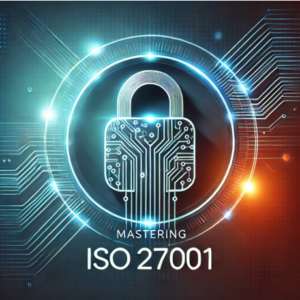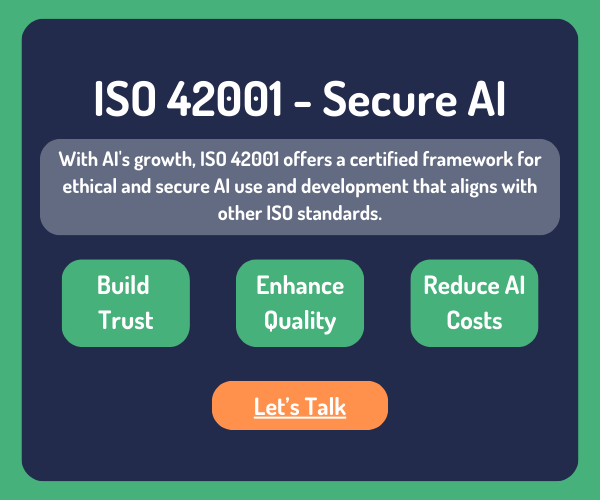In this article
How to Implement ISO 42001 Annex A for AI Compliance
- Sajjad Syed
Discover What’s Ahead in Compliance, Governance, and Cyber Risk Management

Annex A is more than a compliance checklist—it’s the operational core of ISO/IEC 42001, the world’s first AI governance standard.
Whether you’re preparing for ISO 42001 certification or just building an internal AI risk program, Annex A provides the structure you need to ensure your AI systems are:
- Ethical
- Transparent
- Accountable
- Auditable
What Is Annex A?
Annex A defines the control objectives organizations must implement to align with ISO 42001. It covers seven thematic areas, including:
- AI risk assessment
- Governance and accountability
- Data quality and privacy
- Human oversight
- Monitoring and logging
- Lifecycle documentation
- Continuous improvement
These controls are customizable based on your AI system’s complexity and risk profile.
Annex A Control Categories
(At a Glance)
Category | Purpose |
Governance & Roles | Define ownership, responsibility, and policy for AI systems |
Risk Management | Address bias, explainability, and model drift risks |
Human Oversight | Ensure humans can step in when needed |
Data Integrity & Privacy | Track data sources, ensure privacy compliance, and prevent data bias |
Monitoring & Logging | Audit system behavior, performance, and anomalies |
Lifecycle Management | Document AI model development, deployment, and updates |
Feedback & Improvement | Enable reviews, internal audits, and iterative improvements |
Why Is ISO 27001 Important?
In today’s world, cybersecurity and Infosec (Information Security) are crucial. ISO 27001 helps organizations minimize the risk of data breaches, comply with regulations, and build trust with customers. The standard focuses on both preventing risks and improving your systems over time.
Key Control Examples
ISO 42001 isn’t just for AI giants—it’s for any organization that wants to lead with trust, reduce algorithmic risk, and future-proof their AI strategies. If your company develops, deploys, or relies on AI, this standard is quickly becoming essential—not optional.
- AI Governance Structure (A.4.2): Assign leadership roles and formal oversight bodies
- Risk Mitigation (A.5.4): Conduct targeted risk assessments for each AI application
- Human Intervention (A.6.1): Ensure systems can be paused, adjusted, or overridden
- Data Provenance (A.7.3): Document data sources and align with privacy laws
Monitoring & Logging (A.8.5): Track AI behavior post-deployment for audit and review
AI brings new challenges that ISO 27001 or SOC 2 don’t fully cover. ISO 42001 addresses:
- Model Drift: Ensures AI performance is monitored as data evolves
- Opaque Outputs: Mandates documentation for black-box systems
- Real-World Harm: Forces impact assessments before deployment
ISO 42001 aligns with frameworks like the NIST AI RMF and supports interoperability with future AI regulations
Where These Standards Overlap
Though their scopes differ, both ISO 27001 and ISO 42001 require:
Structured Risk Management
Each standard demands the identification and mitigation of relevant threats—cybersecurity or AI-specific.
Policy, Procedures, and Documentation
Robust documentation, version control, and audit readiness are essential in both standards.
Leadership Commitment
Top-level management must ensure resource allocation, internal accountability, and continuous improvement.
Framework Integration
ISO 42001 and ISO 27001 can work in parallel, offering a unified governance approach for high-stakes digital environments.
How to Start Implementing Annex A
- Run a Gap Assessment – Compare your current practices to ISO 42001 controls
- Create Your Statement of Applicability (SoA) – Identify applicable controls and justify exclusions
- Develop Policies and SOPs – Define internal governance, training, and documentation
- Train Stakeholders – Build awareness from engineering to executive levels
- Conduct Internal Audits – Validate readiness before third-party certification
Why It Matters
Annex A brings clarity and accountability to AI systems that often operate in black-box environments. It prepares your company for:
✅ Regulatory readiness
✅ Enterprise procurement
✅ Stakeholder confidence
✅ Ethical and operational resilience
Partner With Consilium Labs
We help compliance-driven, AI-powered organizations build ISO 42001-aligned systems that are:
- Auditable
- Ethical
- Scalable
- Aligned with NIST AI RMF and the EU AI Act
📩 Ready to get Annex A right? Let’s Talk →
Other Articles
Let's get in touch
Start your audit now. Achieving cybersecurity audit can be complex. We have made it our mission to simplify the process, giving you access to the professional expertise you need to prepare your company for the future. Get in touch with us today!





